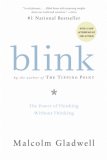Summary | Excerpt | Reading Guide | Reviews | Beyond the Book | Readalikes | Genres & Themes | Author Bio

Critics' Opinion:
Readers' Opinion:
First Published:
Jan 2005, 288 pages
Paperback:
Apr 2007, 320 pages
 Book Reviewed by:
Book Reviewed by:
BookBrowse Review Team
Buy This Book
When our friends rank us on the Big Five, Gosling wanted to know, how closely do they come to the truth? The answer is, not surprisingly, that our friends can describe us fairly accurately. They have a thick slice of experience with us, and that translates to a real sense of who we are. Then Gosling repeated the process, but this time he didn't call on close friends. He used total strangers who had never even met the students they were judging. All they saw were their dorm rooms. He gave his raters clipboards and told them they had fifteen minutes to look around and answer a series of very basic questions about the occupant of the room: On a scale of 1 to 5, does the inhabitant of this room seem to be the kind of person who is talkative? Tends to find fault with others? Does a thorough job? Is original? Is reserved? Is helpful and unselfish with others? And so on. "I was trying to study everyday impressions," Gosling says. "So I was quite careful not to tell my subjects what to do. I just said, ‘Here is your questionnaire. Go into the room and drink it in.' I was just trying to look at intuitive judgment processes."
How did they do? The dorm room observers weren't nearly as good as friends in measuring extraversion. If you want to know how animated and talkative and outgoing someone is, clearly, you have to meet him or her in person. The friends also did slightly better than the dorm room visitors at accurately estimating agreeableness—how helpful and trusting someone is. I think that also makes sense. But on the remaining three traits of the Big Five, the strangers with the clipboards came out on top. They were more accurate at measuring conscientiousness, and they were much more accurate at predicting both the students' emotional stability and their openness to new experiences. On balance, then, the strangers ended up doing a much better job. What this suggests is that it is quite possible for people who have never met us and who have spent only twenty minutes thinking about us to come to a better understanding of who we are than people who have known us for years. Forget the endless "getting to know" meetings and lunches, then. If you want to get a good idea of whether I'd make a good employee, drop by my house one day and take a look around.
If you are like most people, I imagine that you find Gosling's conclusions quite incredible. But the truth is that they shouldn't be, not after the lessons of John Gottman. This is just another example of thin-slicing. The observers were looking at the students' most personal belongings, and our personal belongings contain a wealth of very telling information. Gosling says, for example, that a person's bedroom gives three kinds of clues to his or her personality. There are, first of all, identity claims, which are deliberate expressions about how we would like to be seen by the world: a framed copy of a magna cum laude degree from Harvard, for example. Then there is behavioral residue, which is defined as the inadvertent clues we leave behind: dirty laundry on the floor, for instance, or an alphabetized CD collection. Finally, there are thoughts and feelings regulators, which are changes we make to our most personal spaces to affect the way we feel when we inhabit them: a scented candle in the corner, for example, or a pile of artfully placed decorative pillows on the bed. If you see alphabetized CDs, a Harvard diploma on the wall, incense on a side table, and laundry neatly stacked in a hamper, you know certain aspects about that individual's personality instantly, in a way that you may not be able to grasp if all you ever do is spend time with him or her directly. Anyone who has ever scanned the bookshelves of a new girlfriend or boyfriend—or peeked inside his or her medicine cabinet—understands this implicitly: you can learn as much—or more—from one glance at a private space as you can from hours of exposure to a public face.
This is the full text of Chapter 1 of Blink (pages 18-47). Copyright © 2005 by Malcolm Gladwell. All rights reserved. No part of this book maybe reproduced without written permission from the publisher, Little, Brown & Co.




There is no science without fancy and no art without fact
Click Here to find out who said this, as well as discovering other famous literary quotes!
Your guide toexceptional books
BookBrowse seeks out and recommends the best in contemporary fiction and nonfiction—books that not only engage and entertain but also deepen our understanding of ourselves and the world around us.